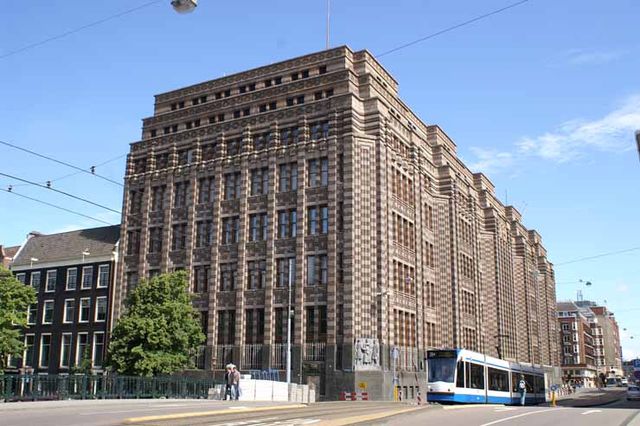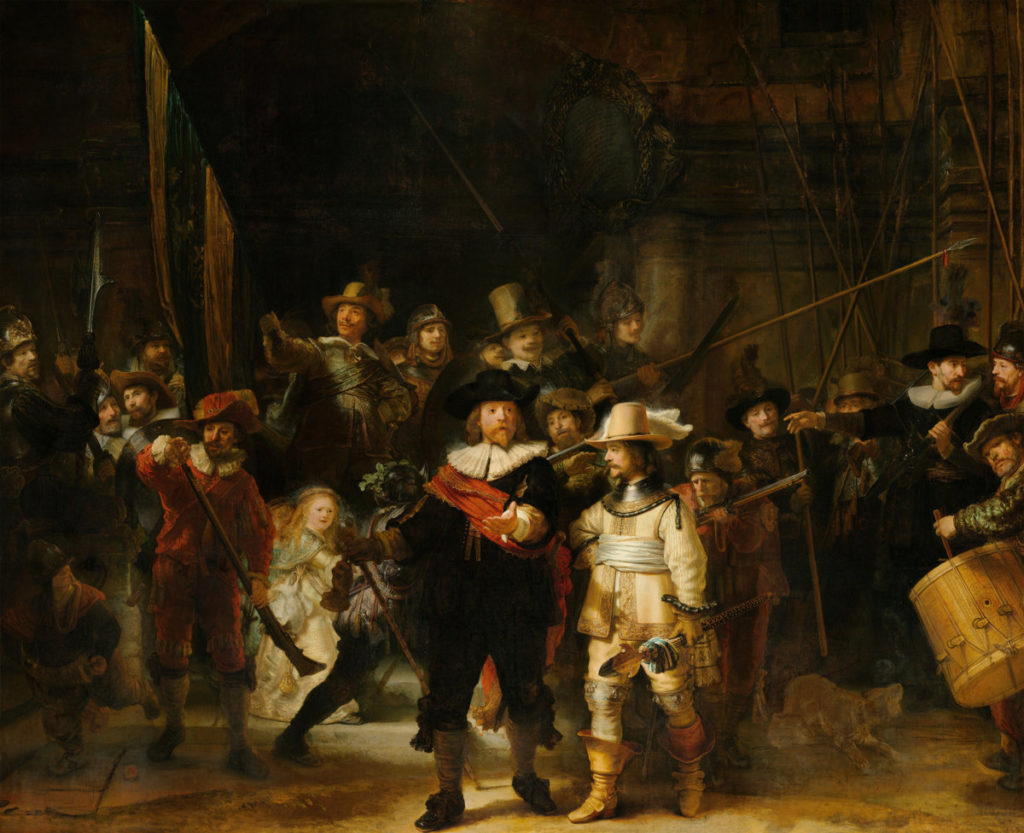- Home location: Amsterdam Royal Concertgebouw and Amsterdam Royal Concertgebouw Orchestra (RCO) House.
- Gustav Mahler himself in the Netherlands (1903, 1904, 1906, 1909 and 1910).
- Amsterdam Royal Concertgebouw Orchestra (RCO) Mahler performances (1903-2017).
- RCO Video (must see).
- Gustav Mahler Festival Amsterdam 2020.
The Amsterdam Royal Concertgebouw Orchestra (RCO) is one of the very best orchestras in the world. But what makes the orchestra so special? Time and time again, critics have lauded its unique sound, which clearly stands out among thousands of others. Although sound is difficult to describe in words, the RCO’s string section has been called ‘velvety’, the sound of the brass ‘golden’, the timbre of the woodwinds ‘distinctly personal’ and the percussion have an international reputation. Dutch: Koninklijk Concertgebouw Orkest (KCO).
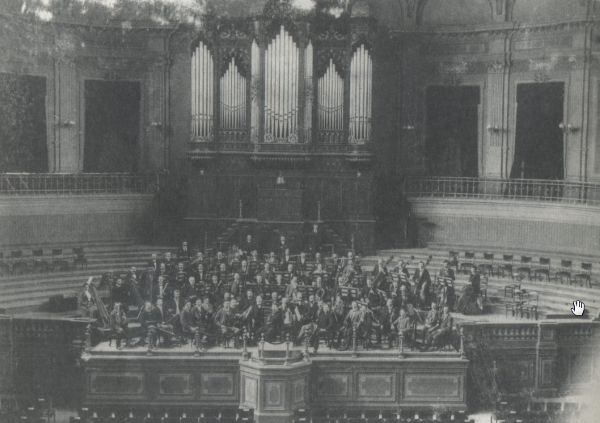
Year 1895. Amsterdam Royal Concertgebouw Orchestra (RCO) with the just appointed Willem Mengelberg (1871-1951) in the Amsterdam Royal Concertgebouw. Willem Mengelberg (1871-1951) laid the foundation for the orchestra’s acclaimed Gustav Mahler tradition. Eduard van Beinum (1900-1959) introduced Bruckner’s symphonies and French music. The Christmas Matinee concerts conducted by Bernard Haitink (1929) and televised in many European countries earned him wide acclaim. Bernard Haitink (1929) was appointed honorary conductor in 1999. Conductor emeritus since 2004, Riccardo Chailly (1953) provided a great impetus to the programming of contemporary music and opera.
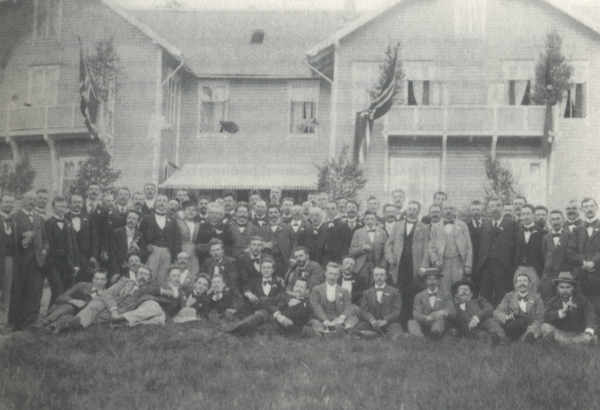
Year 1898. Amsterdam Royal Concertgebouw Orchestra (RCO) with Edvard Grieg (1843-1907) and Willem Mengelberg (1871-1951) in Bergen, Norway. June.
Year 1903. Announcement of the Richard Strauss Festival in London. Richard Strauss (1864-1949), Willem Mengelberg (1871-1951) and Amsterdam Royal Concertgebouw Orchestra (RCO). St. James’s Hall. 03-06-1903, 04-06-1903, 05-06-1903, 08-03-1903 and 09-06-1903.
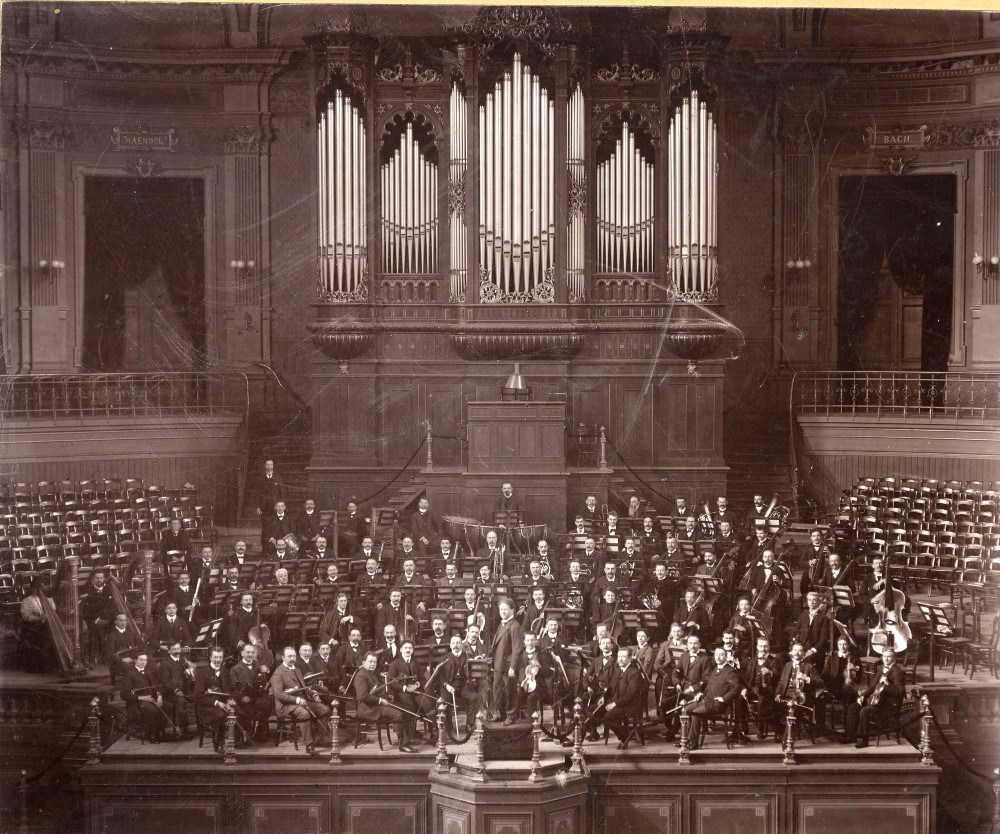
Year 1907. Amsterdam Royal Concertgebouw Orchestra (RCO/KCO) with Willem Mengelberg (1871-1951) in the Amsterdam Royal Concertgebouw. Photographer unknown.
Year 1908. Amsterdam Royal Concertgebouw Orchestra (RCO/KCO) with Willem Mengelberg (1871-1951) in the Trocadero palace, Paris, 14-04-1908, Matthaus Passion.
While the exceptional acoustics of the Royal Concertgebouw, designed by the architect A.L. van Gendt, also play an important role in this respect, no other orchestra sounds like the Royal Concertgebouw Orchestra in the large hall. The influence exerted on the orchestra by its chief conductors, of whom there have been only six in the last 125 years, is also important. As is that of the musicians themselves.
1920. Amsterdam Royal Concertgebouw Orchestra (RCO) and Willem Mengelberg (1871-1951) rehearsal “Heldenleben”.
1947. 01-12-1947. Letter from Otto Klemperer (1885-1973) to Imre Kun: ‘The Amsterdam Royal Concertgebouw Orchestra (RCO) is one of the best orchestras of Europe. Perhaps the best one. The members of this orchestra are near artists. They don’t play only for money, but for art. It is a great artistic pleasure to work with them’.
The Royal Concertgebouw Orchestra is made up of 120 players hailing from over twenty countries. Despite its size, the orchestra actually functions more like a chamber orchestra in terms of the sensitivity with which its members listen to, and work in tandem with, one another. Indeed, this requires both a high individual calibre and a great sense of mutual trust and confidence.
Amsterdam Royal Concertgebouw Orchestra (RCO).
Amsterdam Royal Concertgebouw Orchestra (RCO).
Composers
During Willem Mengelberg (1871-1951)‘s fifty-year tenure, leading composers conducted the orchestra on more than one occasion. Through the years, the orchestra has continued its collaboration with composers such as George Benjamin, Oliver Knussen, Tan Dun and Thomas Adès, who over the last few years have followed in the footsteps of other conducting composers like Gustav Mahler (1860-1911), Richard Strauss (1864-1949), Claude Debussy (1862-1918), Igor Stravinsky (1882-1971), Bruno Maderna, Witold Lutoslawski, Otto Ketting, Luciano Berio, Pierre Boulez, Hans Werner Henze and John Adams.
Amsterdam Royal Concertgebouw Orchestra (RCO).
Repertoire
Programming is based on two essential elements: tradition and renewal. The orchestra has long been praised for its performances of the music of Gustav Mahler (1860-1911) and Anton Bruckner (1824-1896). It also upholds a number of special long-established concert traditions, such as the Passion and Christmas Matinee performances. In addition, the special AAA project series (Alive, Adventurous, Alluring) features music programmed around various changing themes. The orchestra also collaborates with world-renowned guest conductors and specialists. For instance, Nikolaus Harnoncourt, who is largely responsible for the orchestra’s reputation when it comes to eighteenth-century repertoire, was appointed honorary guest conductor in October 2000.
Royal
The Concertgebouw Orchestra was founded in 1888. On the occasion of its 100th anniversary in 1988, the orchestra officially received the appellation ‘Royal’. It celebrates its 125th anniversary in 2013. In addition to some eighty concerts performed at the Concertgebouw in Amsterdam, the Royal Concertgebouw Orchestra gives forty concerts at leading concert halls throughout the world each year. The orchestra participates in residencies in Paris (Salle Pleyel), Brussels (BOZAR), London (Barbican Centre) and Frankfurt (Alte Oper).
Amsterdam Royal Concertgebouw Orchestra (RCO).
Patroness
Her Majesty Queen Máxima.
Chief conductors
- 1888-1895 (07 years): Willem Kes (1856-1934).
- 1895-1945 (50 years): Willem Mengelberg (1871-1951).
- 1945-1959 (14 years): Eduard van Beinum (1900-1959).
- 1963-1988 (25 years): Bernard Haitink (1929).
- 1988-2004 (16 years): Riccardo Chailly (1953).
- 2004-2016 (12 years): Mariss Jansons (1943).
- 2016-2018 (02 years): Daniele Gatti (1961).
- 2018 Vacancy
11-08-2018 Amsterdam: For the season 2018-2019 the Amsterdam Royal Concertgebouw Orchestra (RCO) has replaced Daniele Gatti (1961) by Bernard Haitink (1929), Manfred Honeck (1958), Thomas Hengelbrock (1958) and Kerem Hasan (1992).
Title conductors
- Bernard Haitink (1929) Honorary conductor.
- Riccardo Chailly (1953) Conductor emeritus.
- Mariss Jansons (1943) Conductor emeritus.
- Nikolaus Harnoncourt (1929-2016) Honorary guest conductor. †
Concertmasters
- Christiaan Timmer (1888-1895, 1904-1911)
- André Spoor (1895-1904)
- Louis Zimmermann (1899-1904, 1911-1940). Gustav Mahler Festival Amsterdam 1920.
- Ferdinand Helmann (1919-1948)
- Zoltán Székely (1940-1942)
- Jan Bresser (1940-1965)
- Jan Damen (1948-1957)
- Jacob Krachmalnick (1958-1960)
- Steven Staryk (1960-1963)
- Herman Krebbers (1962-1980)
- Jo Juda (1963-1974)
- Theo Olof (1974-1985)
- Viktor Liberman (1985-1996). Gustav Mahler Festival Amsterdam 1995.
- Jaap van Zweden (1960) (1979-1995)
- Rudolf Koelman (1996-1999)
- Alexander Kerr (1996-2006)
- Vesko Eschkenazy (since 1999)
- Liviu Prunaru (since 2006)
1954. Amsterdam Royal Concertgebouw Orchestra (RCO/KCO) in New York. 120 members. Leaving from Rotterdam in 01-10-1954, arriving in New York on 11-10-1954. Conductors: Eduard van Beinum (1900-1959) and Rafael Kubelik. 45 concerts in 53 days.
The first trips abroad
- 1898: Bergen, Norway. Host Edvard Grieg (1843-1907).
- 1900: Brussels, Belgium.
- 1901: Liege, Belgium.
- 1903: London, United Kingdom. Richard Strauss (1864-1949) Festival in London with Willem Mengelberg (1871-1951). (03-06-1903 etc.)
- 1907: Brussels, Belgium.
- 1907: Antwerp, Belgium.
- 1908: Brussels, Belgium.
- 1908: Paris, France.
- 1912: Frankfurt, Germany (Matthaus-Passion, Mahler Symphony Nos. 4 and 8, Diepenbrock)
- 1913: Paris, France.
Bells for the Royal Concertgebouw Orchestra (RCO)
2020. The Freundeskreis Schweiz of the Royal Concertgebouw Orchestra made a generous donation to the orchestra and our chief-conductor Mariss Jansons. We received three specially cast bells for our percussion section. These bells are particularly useful in compositions like Mussorgsky’s “Pictures of an exhibition” and Berlioz’s “Symphonie Fantastique”. In this film the third bell is cast by Royal Eijsbouts Bell Foundry in Asten.
Royal Concertgebouw Orchestra (RCO) – Mahler Archive (1903-2019)

RCO’s most frequently Mahler conductors (Click for video)
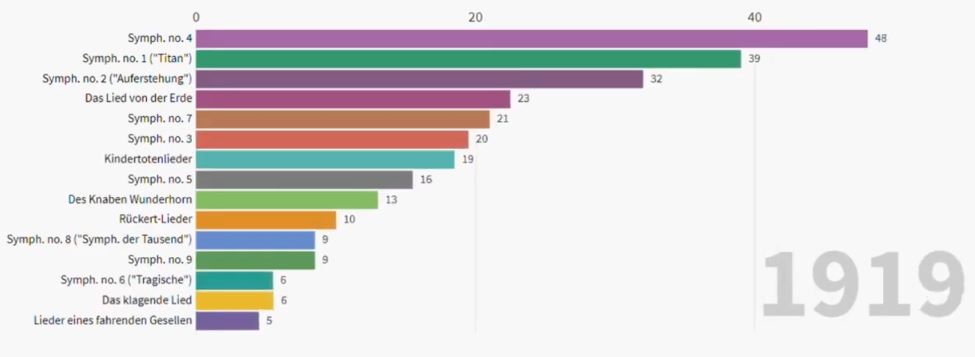
RCO’s most frequently performed Mahler compositions (Click for video)
- Source: archief.concertgebouworkest.nl/en/archive/search/
- Editor: Peter Kooreman
More


